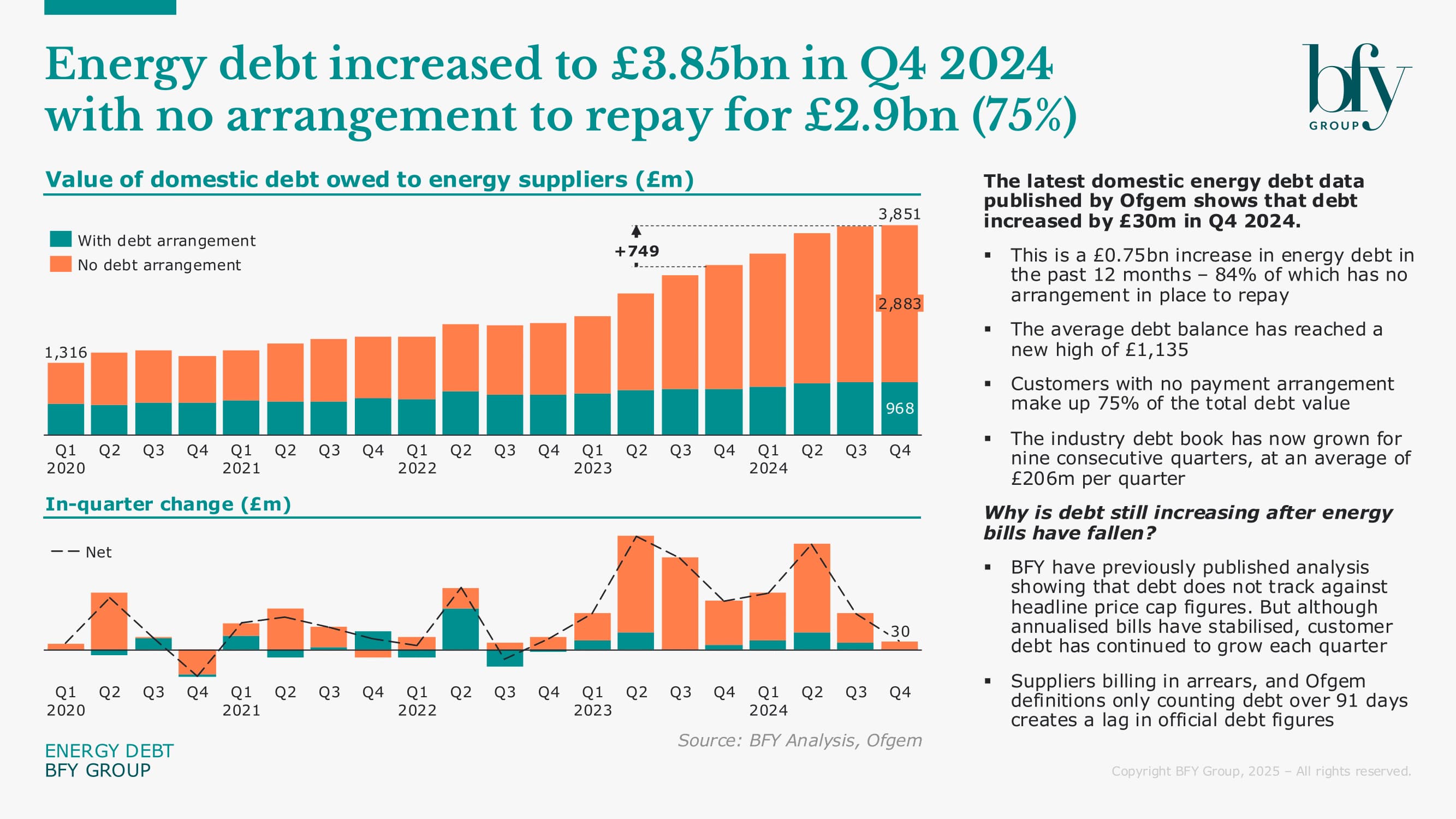Our latest analysis indicates that domestic suppliers faced a £1.5bn cash coverage deficit at the end of Q4-24.
This marks the fourth consecutive quarter in which suppliers have had to finance a shortfall in net balances - a clear departure from historical trends and a stark indication of the ongoing challenges in maintaining capital adequacy.

Key points:
- The gross customer credit balance across domestic energy suppliers fell to ~£3.3bn at the end of Q4-24
- During this same period, market debt reached a new high of £3.85bn
- This negative net cash position required suppliers to make up a deficit of £1.5bn to reach the required 20% credit balance cash reserve in Q4-24
This marks a significant shift from previous years. Historically, suppliers maintained a positive net cash position in Q3 with credit balances at their seasonal peak. However, suppliers have now faced a cash deficit for four consecutive quarters.
While this doesn't show suppliers are falling short of their cash coverage targets, it clearly demonstrates the ongoing challenges energy retailers face in ensuring capital adequacy.
Energy debt hits £3.85bn, but growth slows to lowest rate since 2022
Domestic energy debt hit a record £3.85bn in Q4 2024, rising by £0.75bn over the past year.
Although a seasonal increase from Q3 to Q4 is expected due to winter consumption, the latest rise of £30m was the smallest quarterly jump since 2022, indicating a potential shift in the crisis.
Key insights from Ofgem’s latest data:
- Winter energy consumption has driven total debt up by £30m to £3.85bn, marking the ninth consecutive quarter of increases. However, the rate of growth has slowed.
- Debt growth between Q3 and Q4 returned to pre-crisis levels, reflecting the slowest quarterly increase since 2022. The number of indebted households also saw a slight decline.
- Alarmingly, £2.9bn (75%) of the total debt has no repayment plan in place, with affected households owing an average of over £1,500.
Read the full article with more charts and insights here.

Our Impact: Cash recovery initiatives deliver ~£275m benefit for large Energy supplier
BFY’s debt team supported a large Energy supplier with recovering their cash position, achieving a total benefit of ~£275m through collaborative initiatives.
How did BFY help?
Our debt team helped the supplier to re-think their approach to cash collection, encouraging a focus on:
- Prioritisation of the unbilled backlog, supported by root cause analysis of challenge drivers
- Implementation of unbilled focus groups, to help resolve issues and drive a reduction in backlog volume
- Enhancing proactivity in the customer engagement strategy to help build customer relationships, whist reducing payment delays and rebill occurrence
- Implementation of engagement strategy effectiveness measures, creating performance transparency, whilst driving greater ownership and management of customer accounts
- Increasing the accuracy and consistency of cash performance reporting, leading to a step change in operational collaboration within the team and the wider business
What were the results?
Overall, these collaborative initiatives enabled a ~£275m improvement in the supplier’s cash position, with operational and leadership effectiveness maximised by enhanced performance reporting and an improved customer engagement strategy.
The supplier also reduced their aged unbilled value by ~£45m, through focus groups dedicated to addressing their backlog. This was achieved by leveraging data, identifying root causes, and shaping the appropriate account remedy for improved customer engagement.
Read the case study here.
For more on strategies for managing capital adequacy challenges in your organisation, contact Rachel Littlewood.
Rachel Littlewood
Director
Rachel leads our operational and financial turnaround engagements, helping to solve complex operational challenges while maximising commercial performance and customer outcomes.
View Profile

